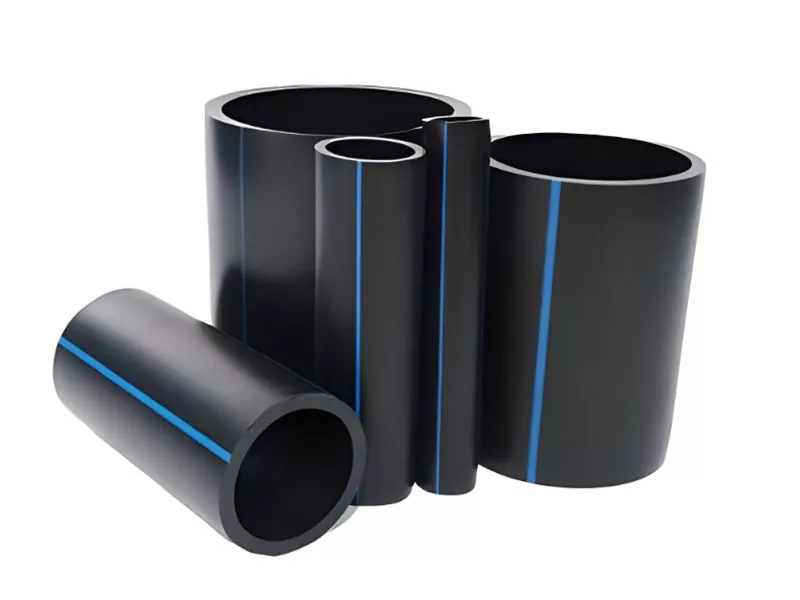The Future of American Plastics HDPE Pipe Manufacturing: What You Need to Know
Wiki Article
Understanding the Key Advantages of HDPE Pipeline for Water and Wastewater Management
The use of HDPE pipe in water and wastewater monitoring offers numerous benefits that warrant factor to consider. Its exceptional toughness and lengthy life expectancy make it a recommended option for lots of jobs. Furthermore, the material's resistance to corrosion and chemical damages enhances its reliability in various environments. The advantages expand past just longevity and resistance. Midland TX HDPE Pipe Fittings in Stock. Discovering its cost-effectiveness and environmental impact discloses even more compelling factors for its prevalent adoption in contemporary facilitiesExceptional Durability and Long Life

HDPE pipeline attracts attention for its phenomenal durability and durability, making it a preferred option in water management systems. Built from high-density polyethylene, these pipelines can stand up to considerable pressure and anxiety, ensuring trustworthy performance in time. Their durable nature allows them to withstand severe environmental problems, consisting of temperature changes and dirt movements, which can trigger various other products to stop working.
The lifespan of HDPE pipes usually exceeds 50 years, supplying a cost-effective option for districts and industries alike. Additionally, the product's lightweight buildings simplify installation, decreasing labor expenses and durations. This longevity minimizes the need for constant repair work or substitutes, even more improving its economic charm.
In water administration applications, the dependability of HDPE pipes indicates fewer disruptions and enhanced service continuity, making them integral to lasting framework growth. The mix of longevity and long life strengthens HDPE's duty as a keystone in efficient water monitoring solutions.

Resistance to Rust and Chemical Damages
While lots of products catch deterioration and chemical damages with time, HDPE pipelines exhibit exceptional resistance, making them optimal for different water administration applications. This strength comes from the molecular framework of high-density polyethylene, which is inherently non-reactive and does not wear away like steels or weaken from direct exposure to rough chemicals. Consequently, HDPE is very reliable in settings with hostile compounds, such as wastewater systems that might contain acids, bases, and natural solvents.
In addition, HDPE pipelines can stand up to environmental factors such as dirt level of acidity and saline problems, better improving their suitability for diverse applications (Pipe Manufacturing Midland TX). Their capacity to preserve structural stability in time reduces the threat of leakages and failures, which is critical in ensuring the safety and security and dependability of water circulation and wastewater administration systems. The resistance to corrosion and chemical damage significantly contributes to the general effectiveness and durability of HDPE piping solutions.
Cost-Effectiveness and Financial Benefits
When taking into consideration the economic implications of water administration systems, the cost-effectiveness of HDPE pipes ends up being noticeable. These pipes supply lower installment and maintenance expenses contrasted to traditional materials like steel or concrete. Their lightweight nature simplifies transport and installment, causing minimized labor expenditures. Additionally, HDPE pipes show a lengthy lifespan, usually exceeding 50 years, which equates to less substitutes and lasting savings.The resistance of HDPE to corrosion and chemical damage decreases the need for expensive repair services and substitutes. The pipelines additionally sustain reliable water flow, reducing energy costs related to pumping systems. By mitigating leaks and water loss, HDPE pipes contribute to significant economic benefits for municipalities and industries alike. In general, the preliminary investment in HDPE piping can yield considerable monetary returns over the life expectancy of the water administration system, making it a prudent choice for sustainable infrastructure development.
Environmental Sustainability and Lowered Influence

Convenience and Adaptability in Setup
Due to the fact that of their one-of-a-kind properties, HDPE pipes supply exceptional convenience and versatility in setup, making them suitable for a large range of applications. Their lightweight nature enables less complicated handling and transport, decreasing labor costs and installment time. HDPE pipes can be curved and shaped to fit various terrains and project needs, which is particularly beneficial in challenging atmospheres.In addition, their resistance hdpe pipe suppliers Midland TX to rust and chemical damages enables installation in varied settings without the demand for specialized protective layers. The ability to fuse joints produces a continual, leak-free system, improving the general integrity and dependability of the setup. HDPE's adaptability also fits ground movement, reducing the danger of damages in areas vulnerable to shifting dirt. In general, these features make HDPE pipes not just functional but additionally a preferred selection for water and wastewater monitoring systems.
Regularly Asked Questions
Exactly How Does HDPE Pipeline Contrast to PVC in Water Management Applications?
HDPE pipeline provides premium flexibility, resistance to rust, and resilience contrasted to PVC. Its lighter weight facilitates much easier installation, while its long life expectancy lowers replacement expenses, making HDPE a recommended selection in water management applications.What Is the Life Expectancy of HDPE Pipes Under Common Conditions?
Under regular problems, HDPE pipes can have a lifespan ranging from 50 to 100 years. Their longevity and resistance to corrosion contribute to their long-lasting performance in different applications, making them a reliable option for facilities.Are HDPE Water Lines Recyclable After Their Solution Life?
Yes, HDPE pipelines are recyclable after their life span. Texas hdpe pipe manufacturer. They can be processed and repurposed into brand-new items, substantially minimizing ecological effect and advertising sustainability within the market, making them a green selection for piping optionsWhat Is the Installment Refine for HDPE Water Lines?
The setup process for HDPE pipelines includes site preparation, trenching, pipeline combination or mechanical joining, backfilling, and pressure screening. Appropriate methods guarantee a durable and reliable system for delivering water and wastewater successfully.Can HDPE Piping Be Made Use Of for Both Drinkable and Non-Potable Water Systems?
Yes, HDPE pipelines can be utilized for both potable and non-potable water supply. Their adaptability, sturdiness, and resistance to corrosion make them ideal for different applications, ensuring secure and reliable transportation of water in different contexts.Report this wiki page